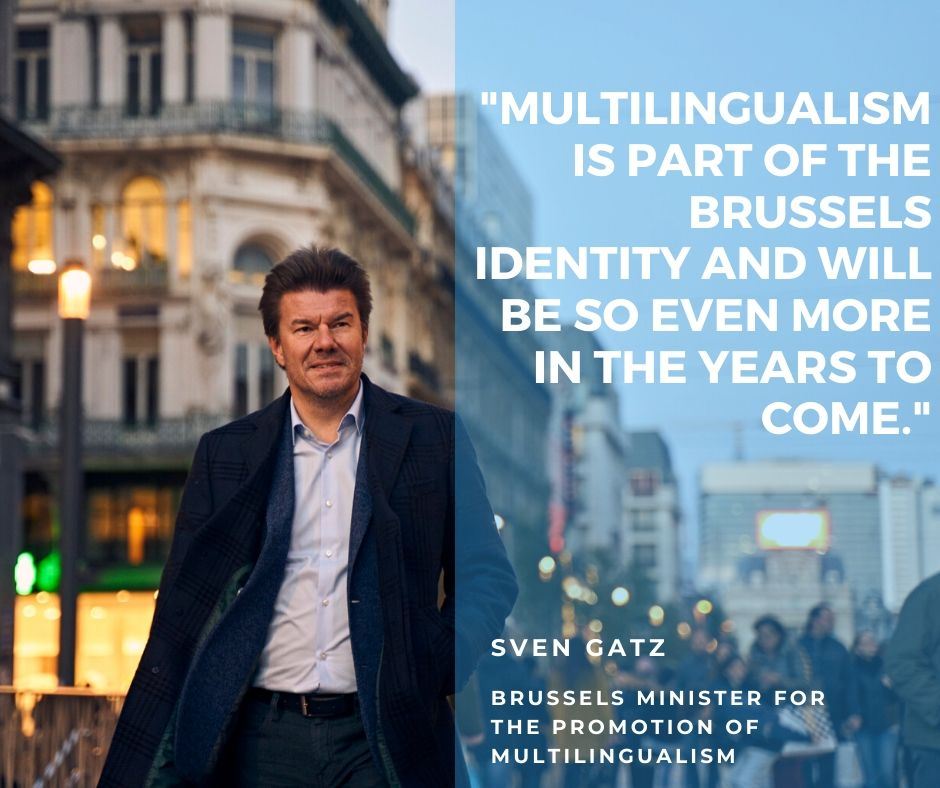“Everyone in Brussels should be multilingual at age 18”
Brussels Minister Sven Gatz introduces his vision text on multilingualism
Today, Brussels minister for the Promotion of Multilingualism Sven Gatz is presenting his vision text on multilingualism in the Brussels Parliament. The text outlines his vision on multilingualism in the super-diverse Brussels Region, as well as his objectives. “We aim for everyone in Brussels to be at least trilingual (Dutch, French and English) at age 18,” says minister Gatz.
The Brussels Capital Region counts 1,2 million inhabitants speaking over 100 different languages. This makes Brussels the second most cosmopolitan region of the world, after Dubai.
“In order to improve the functioning of this cosmopolitan metropolis, to stimulate social cohesion between its inhabitants and to offer them a stronger position on the labour market, the Brussels government has made multilingualism a policy priority”, says minister Gatz.
Importance of multilingualism – the figures
Research shows that support for bi- and multilingualism is growing in Brussels. A majority of the city's inhabitants is in favour of some form of multilingual education and feels that language skills are essential in finding a job. Seventy percent of Brussels' residents see multilingualism as an essential part of the city's identity. According to the latest Language Barometer (2018), 90% of the inhabitants of Brussels advocate bilingual primary schools.
Multilingualism also creates leverage on the labour market. Numbers released by the Brussels Employment Office Actiris show that: 53% of Brussels job openings explicitly require proficiency in two or three languages, 80% of those require proficiency in both Dutch and French and 40% require good English skills. The numbers also show that just 2% of the capital’s job seekers are actually trilingual French, English and Dutch. European research suggests that 11% of companies indicate having lost at least one contract due to insufficient language skills of their staff.
“The benefits of multilingualism are many. Aside from landing them a job, multilingualism can promote cohesion between the inhabitants of Brussels. In the super-diverse and multilingual city, as well as beyond its borders, the mastery of several languages is essential to achieve a shared sense of citizenship, in which all citizens are able to talk to one another and understand each other. Multilingualism is part of the Brussels identity and this feeling will continue to grow in the future,” according to minister Gatz.
Ambition of the Brussels Government
Brussels is already home to quite a lot of organizations and initiatives working with or on language diversity. Minister Gatz would like to map these out in order to obtain a clear overview of all potential partners, ambassadors and existing initiatives that can help shape a successful future policy.
In order to help shape the new policy area and to develop an action plan, a Council for Multilingualism will be created, an umbrella institution in which all partners and experts will be represented.
Schools and educational institutions will also be involved. They will play a crucial role in making everyone in Brussels at least trilingual Dutch, French and English at the age of 18. The policy will also consider the native languages that are spoken at home. A good mastery of the language that children learn from their parents, brothers and sisters at an early age, is key to the subsequent acquisition of all other languages. The efforts and investments in bilingual teachers education will be continued and the exchange between Dutch and French speaking teachers will be further stimulated.
Furthermore, the Brussels government seeks to expand and reinforce the language courses available to job seekers through the creation of a ‘Language Hub’.
Existing initiatives such as the European Day of Multilingualism and the Day of European Languages are opportunities that can be seized to highlight the capital's multilingual image. This is why minister Gatz, together with the European Commission, the Council of Europe and the Brussels Parliament, aims to organize a Day of Multilingualism specifically focusing on the Brussels context.
Minister Sven Gatz concludes: “With this vison text I hope to feed the debate that will shape the promotion of multilingualism. Over the next five years, the government of the Brussels Region intends to take additional steps in this direction and to be the driving force behind this debate.”
- Please find the vision text in attachment below.
